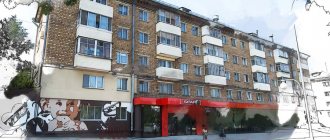When might it be required in an apartment building?
The first floors of houses in residential areas are perfect for opening offices, organizing a business in the service sector or retail trade. However, the law allows you to engage in business activities in residential premises without changing their legal status in rare situations. The entrepreneur must be registered and live in the apartment .
At the same time, by his activities he must not violate the rights of other people living in this premises, as well as neighbors. These provisions are spelled out in Art. 17 Housing Code of the Russian Federation. Other apartment owners whose activities are not permitted by law in residential premises will have to change the status of the premises in order to organize offices, beauty salons or shops.
We talked in detail about the nuances of converting residential premises into non-residential premises for different real estate, as well as in what situations changing the purpose of an object is not allowed in this article.
General meeting of residents
First, you need to notify all residents of the house (hang up a notice, send registered letters, or personally hand over notices against signature). It is better to find out in advance from the chairman of the house or the HOA what form of notification to the owners about the meeting is provided for by the house management rules.
Owners must be notified no later than 10 days before the meeting date.
The notice must indicate:
- the reason for holding the meeting;
- personal data of the initiator of the meeting;
- date, time, place.
In order for residential premises to be converted into non-residential premises, this idea must be approved by at least 50% of the residents of the building. At the same time, there must be at least ⅔ positive votes from the entrance to which the premises are planned to be transferred.
The decision of the meeting of owners is documented in the form of minutes
How to translate: procedure
The Office of the Housing Fund of the Department of Municipal Property , the Department of Housing Policy and Housing Fund and other local government bodies for But the easiest way to deal with this issue is through the local Multifunctional Center.
The procedure for transferring premises from residential to non-residential status is regulated by Article 23 of the Housing Code. It looks like this:
- Collection of documents necessary to submit an application to the interdepartmental commission.
- Submitting an application to transfer the premises to non-residential or residential status to the Property Management Department (you can find out what is included in the package of documents for transferring the premises from non-residential to residential and how to write an application here).
- Wait for permission. In case of refusal, the reason is indicated, after eliminating which the previous steps should be repeated.
- Contacting the Bureau of Technical Inventory in order to determine the cost of transferring premises from residential to non-residential. This can be done either directly at the BTI or through the Multifunctional Center.
- Wait for the commission's decision on the cost of transferring the premises to a new status.
- Pay the resulting difference.
- Register ownership of the property with the local Rosreestr Office.
When transferring a premises from non-residential to residential status, you will have to go through the same steps.
Read in detail about how to change the status of housing from residential to non-residential, as well as what documents are needed for this, and from this article you will learn about in what cases it is not allowed to change the purpose of an object and what to do if you receive a refusal .
Professional assistance in transferring premises to non-residential premises
Given the complexity and many nuances of the procedure for transferring a residential apartment to a non-residential property, it is not always possible to successfully carry out this procedure on your own. In addition, it takes a lot of time and effort, and ignorance of the intricacies of the process can negate all your efforts. To avoid such problems, there is only one right choice - turn to specialists.
Our company has extensive experience and an established system of cooperation with government agencies. Thanks to this, we will be able to carry out for you in St. Petersburg (St. Petersburg) the transfer of a residential apartment to a non-residential one in the shortest possible time and save you from unnecessary hassle and fruitless visits to the authorities.
1. General provisions and basic concepts.
1.1. This Regulation was developed on the basis of Federal Law No. 152-FZ of July 27, 2006 “On Personal Data” and determines the Organization’s policy regarding the processing of personal data.
1.2. Basic concepts used in this provision:
-personal data – any information relating to a directly or indirectly identified or identifiable individual (subject of personal data);
-personal data operator (operator) - a state body, municipal body, legal or natural person, independently or jointly with other persons organizing and (or) carrying out the processing of personal data, as well as determining the purposes of processing personal data, the composition of personal data to be processed, actions (operations) performed with personal data;
-processing of personal data – any action (operation) or set of actions (operations) with personal data performed using automation tools or without their use. Processing of personal data includes, but is not limited to: collection; record; systematization; accumulation; storage; clarification (update, change); extraction; usage; transmission (distribution, provision, access); depersonalization; blocking; deletion; destruction.
-automated processing of personal data – processing of personal data using computer technology;
-distribution of personal data – actions aimed at disclosing personal data to an indefinite number of persons;
-providing personal data – actions aimed at disclosing personal data to a certain person or a certain circle of persons;
-blocking of personal data – temporary cessation of processing of personal data (except for cases where processing is necessary to clarify personal data);
-destruction of personal data – actions as a result of which it becomes impossible to restore the content of personal data in the personal data information system and (or) as a result of which material media of personal data are destroyed;
-depersonalization of personal data – actions as a result of which it becomes impossible to determine the ownership of personal data to a specific subject of personal data without the use of additional information;
-personal data information system – a set of personal data contained in databases and information technologies and technical means that ensure their processing.
-client - a person who contacted the Organization to receive services and entered into an agreement for the provision of services.
-organization – Central Real Estate Agency.
1.3 This Regulation applies to any action (operation) or set of actions (operations) performed using automation tools or without the use of such tools with personal data, including collection, recording, systematization, accumulation, storage, clarification (updating, changing), extraction, use, transfer (distribution, provision, access), depersonalization, blocking, deletion, destruction of personal data.
1.4. This Regulation is subject to revision and, if necessary, updating in the event of changes in the legislation of the Russian Federation on personal data.
2. Principles and purposes of processing personal data.
2.1. Processing of personal data is carried out on the basis of the following principles:
— processing of personal data is carried out on a legal and fair basis;
– the processing of personal data is limited to the achievement of specific, predetermined and legitimate purposes;
— processing of personal data incompatible with the purposes of collecting personal data is not permitted;
- it is not allowed to combine databases containing personal data, the processing of which is carried out for purposes that are incompatible with each other;
— the content and volume of personal data processed correspond to the stated purposes of processing. The personal data processed is not redundant in relation to the stated purposes of processing;
— when processing personal data, the accuracy of personal data and their sufficiency are ensured, and, where necessary, the relevance of personal data in relation to the stated purposes of their processing;
— storage of personal data is carried out in a form that makes it possible to identify the subject of personal data no longer than required by the purposes of processing personal data, unless the period for storing personal data is established by federal law, an agreement to which the subject of personal data is a party, beneficiary or guarantor;
— processed personal data is subject to destruction or depersonalization upon achievement of the processing goals or in the event of the loss of the need to achieve these goals, unless otherwise provided by federal law.
2.2.The purposes of processing personal data are:
-provision of services, conclusion, execution and termination of civil contracts with individuals and legal entities
-carrying out marketing campaigns, promoting the Organization’s products and services, assessing the quality of customer service;
— for communication between the Organization’s employees and the subject of personal data for purposes related to the provision of services;
— issuing commercial offers, invoices, concluding contracts for the provision of services and/or sale of goods;
— for other purposes not prohibited by current legislation.
3. Conditions for processing personal data.
3.1 Processing of personal data is carried out in compliance with the principles and rules established by the Federal Law “On Personal Data”. Processing of personal data is carried out in the following cases:
— processing of personal data is carried out with the consent of the subject of personal data to the processing of his personal data;
— the processing of personal data is necessary to achieve the goals provided for by an international treaty of the Russian Federation or law, to implement and fulfill the functions, powers and responsibilities assigned by the legislation of the Russian Federation to the operator;
- processing of personal data is necessary for the execution of an agreement to which the subject of personal data is a party or beneficiary or guarantor, as well as to conclude an agreement on the initiative of the subject of personal data or an agreement under which the subject of personal data will be a beneficiary or guarantor;
— processing of personal data is necessary to protect the life, health or other vital interests of the subject of personal data, if obtaining the consent of the subject of personal data is impossible;
— the processing of personal data is necessary to exercise the rights and legitimate interests of the operator or third parties or to achieve socially significant goals, provided that the rights and freedoms of the subject of personal data are not violated;
— the processing of personal data is carried out for statistical or other research purposes, subject to the mandatory anonymization of personal data. The exception is the processing of personal data for the purpose of promoting goods, works, services on the market by making direct contacts with potential consumers using communication means;
- processing of personal data is carried out, access to an unlimited number of persons, to which is provided by the subject of personal data or at his request.
3.2. The organization undertakes not to disclose or distribute personal data to third parties without the consent of the subject of personal data, unless otherwise provided by federal law.
3.3 When filling out a feedback form or ordering a service online on the Organization’s website, it is recognized that the subject of personal data has given his consent to the processing of the personal data communicated to him (in the form of Appendix No. 1).
4. Responsibilities of the Organization.
4.1. In accordance with the requirements of Federal Law No. 152-FZ “On Personal Data”, the Organization is obliged to:
- provide the subject of personal data, upon his request, with information regarding the processing of his personal data, or on legal grounds provide a refusal within thirty days from the date of receipt of the request of the subject of personal data or his representative;
— at the request of the subject of personal data, clarify, block or delete the processed personal data;
— notify the subject of personal data about the processing of personal data in the event that the personal data was not received from the subject of personal data, with the exception of the following cases:
— the subject of personal data is notified of the Organization’s processing of his personal data;
— personal data was received by the Organization in connection with the execution of an agreement to which the subject of personal data is a party or beneficiary or guarantor or on the basis of federal law;
— personal data is made publicly available by the subject of personal data or obtained from a publicly available source;
— The organization processes personal data for statistical or other research purposes, unless the rights and legitimate interests of the subject of personal data are violated;
— providing the subject of personal data with the information contained in the Notice of processing of personal data violates the rights and legitimate interests of third parties.
4.2. The condition for terminating the processing of personal data is:
— achieving the goals of processing personal data;
— expiration of the consent to the processing of personal data or withdrawal of consent by the subject of personal data to the processing of his personal data.
4.3. If the subject of personal data withdraws consent to the processing of his personal data, the Organization is obliged to stop processing personal data and destroy personal data within a period not exceeding thirty days from the date of receipt of the said revocation, unless otherwise provided by an agreement between the Organization and the subject of personal data.
5. Rights of the subject of personal data
In accordance with the Federal Law “On Personal Data”, the subject of personal data has the right:
1) obtain information regarding the processing of personal data by the Organization, namely:
— confirmation of the fact of processing of personal data by the Organization;
— legal grounds and purposes of processing personal data by the Organization;
— methods of processing personal data used by the Organization;
— name and location of the Organization, information about persons (except for employees of the Organization) who have access to personal data or to whom personal data may be disclosed on the basis of an agreement with the operator or on the basis of federal law;
— processed personal data related to the relevant subject of personal data, the source of their receipt, unless a different procedure for the presentation of such data is provided for by federal law;
— terms of processing of personal data by the Organization, including terms of their storage;
— the procedure for the exercise by the subject of personal data of the rights provided for by the Federal Law “On Personal Data”;
— other information provided for by the Federal Law “On Personal Data” or other federal laws;
2) require the Organization to clarify his personal data, block it or destroy it if the personal data is incomplete, outdated, inaccurate, illegally obtained or is not necessary for the stated purpose of processing;
3) withdraw consent to the processing of personal data in cases provided for by law.
6. Responsibility for violation of the rules governing the processing and protection of personal data.
6.1 Persons guilty of violating the requirements of Federal Law No. 152-FZ of July 27, 2006 “On Personal Data” bear the responsibility provided for by the legislation of the Russian Federation.
6.2. Moral damage caused to the subject of personal data as a result of violation of his rights, violation of the rules for processing personal data, legislation, as well as requirements for the protection of personal data is subject to compensation in accordance with the legislation of the Russian Federation. Compensation for moral damage is carried out regardless of compensation for property damage and losses incurred by the subject of personal data.
6.3. Employees of the Organization who have received access to personal data of clients in the prescribed manner and who are guilty of violating the rules governing the receipt, processing and protection of personal data of students are held accountable under current legislation.
What projects and works are needed for translation?
It is almost impossible to do without construction work when converting non-residential premises into residential ones. The exception is cases when the property initially fully complies with the standards in force for housing. For approvals and repairs, you need to order a redevelopment and reconstruction project. Depending on the initial state of the object, the project may include the following work:
- dismantling a separate entrance group, sealing a separate exit to the street, cutting and arranging a doorway to common areas in the entrance;
- cutting windows for each room in the future apartment, since it is necessary to achieve the appropriate level of natural light;
- you need to make a separate or combined bathroom that meets the requirements for housing (for example, the bathroom should not directly open into the room, whereas there are no prohibitions for non-residential premises);
- it is necessary to create a separate place for cooking (kitchen), if it was not available at the non-residential property;
- it is necessary to ensure compliance with sanitary safety standards (thermal and waterproofing of walls, locations of plumbing and engineering equipment, microbiological and other indicators).
And this is not a complete list of works, since Decree No. 47 and Decree of the State Construction Committee of the Russian Federation No. 2003 clearly describe the signs of improvement of a residential building and premises. For example, if MKD apartments have a full range of utilities, including gas, the object being transferred must also be provided with them.
All these standards will definitely be taken into account by experienced specialists of the Cadastral Moscow company. Order design and approval support from us. This will be the key to the successful completion of the procedure for transferring non-residential premises to residential ones.
Residential premises must comply with standards for area, natural light, and other safety indicators
List of documents for approval of translation
Although the exact list of documents for translation may vary slightly, the standard list will include:
- title document for a non-residential property;
- written consent from each copyright holder of the premises;
- BTI registration certificate;
- design and working documentation;
- technical report;
- act of the acceptance committee of the Moscow Institute of Life Sciences;
- technical plan for the premises with new characteristics.
There is one more nuance. If the translation work will affect the appearance of the facades, approval will also take place through MosKomArchitecture. The exact list of documents and approvals will be determined by the specialists of the Cadastral Moscow company.
How to correctly draw up technical specifications for design and approval
The more accurately the technical specifications are drawn up, the fewer problems will arise during the development of the project and approvals. The terms of reference indicate the initial information on the object, the required result (i.e. development of the project, approvals to change the status of the object). The TOR must also indicate a list of works that will be required for non-residential premises. Entrust the preparation of technical specifications to professionals! We will help you draw up the document strictly for your purposes and provide all the necessary work and services.
[su_document url=”https://xn—-8sbnaobhgmnivvj0c8a.xn--80adxhks/wp-content/uploads/2020/03/TZ-na-perevod-nezhilogo-pomeshhenija-v-zhiloe.doc”]




